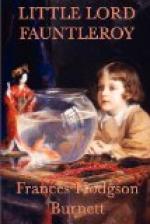“Ah!” he said, in his harsh voice, but giving his hand rather graciously. “Good-morning, Mordaunt. I’ve found a new employment, you see.”
He put his other hand on Cedric’s shoulder,—perhaps deep down in his heart there was a stir of gratified pride that it was such an heir he had to present; there was a spark of something like pleasure in his eyes as he moved the boy slightly forward.
“This is the new Lord Fauntleroy,” he said. “Fauntleroy, this is Mr. Mordaunt, the rector of the parish.”
Fauntleroy looked up at the gentleman in the clerical garments, and gave him his hand.
“I am very glad to make your acquaintance, sir,” he said, remembering the words he had heard Mr. Hobbs use on one or two occasions when he had been greeting a new customer with ceremony.
Cedric felt quite sure that one ought to be more than usually polite to a minister.
Mr. Mordaunt held the small hand in his a moment as he looked down at the child’s face, smiling involuntarily. He liked the little fellow from that instant—as in fact people always did like him. And it was not the boy’s beauty and grace which most appealed to him; it was the simple, natural kindliness in the little lad which made any words he uttered, however quaint and unexpected, sound pleasant and sincere. As the rector looked at Cedric, he forgot to think of the Earl at all. Nothing in the world is so strong as a kind heart, and somehow this kind little heart, though it was only the heart of a child, seemed to clear all the atmosphere of the big gloomy room and make it brighter.
“I am delighted to make your acquaintance, Lord Fauntleroy,” said the rector. “You made a long journey to come to us. A great many people will be glad to know you made it safely.”
“It was a long way,” answered Fauntleroy, “but Dearest, my mother, was with me and I wasn’t lonely. Of course you are never lonely if your mother is with you; and the ship was beautiful.”
“Take a chair, Mordaunt,” said the Earl. Mr. Mordaunt sat down. He glanced from Fauntleroy to the Earl.
“Your lordship is greatly to be congratulated,” he said warmly.
But the Earl plainly had no intention of showing his feelings on the subject.
“He is like his father,” he said rather gruffly. “Let us hope he’ll conduct himself more creditably.” And then he added: “Well, what is it this morning, Mordaunt? Who is in trouble now?”
This was not as bad as Mr. Mordaunt had expected, but he hesitated a second before he began.
“It is Higgins,” he said; “Higgins of Edge Farm. He has been very unfortunate. He was ill himself last autumn, and his children had scarlet fever. I can’t say that he is a very good manager, but he has had ill-luck, and of course he is behindhand in many ways. He is in trouble about his rent now. Newick tells him if he doesn’t pay it, he must leave the place; and of course that would be a very serious matter. His wife is ill, and he came to me yesterday to beg me to see about it, and ask you for time. He thinks if you would give him time he could catch up again.”




